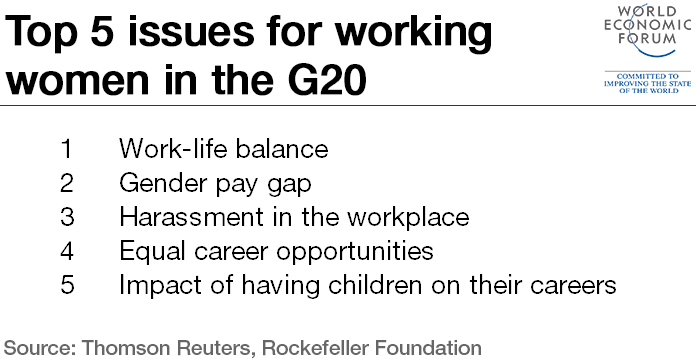These are the top 5 issues facing working women in G20 countries
Stay up to date:
Future of Work
Work-life balance is the top workplace concern for women in G20 countries, according to a poll of more than 9,500 women by the Thomson Reuters and Rockefeller foundations.
Juggling commitments at work and home was flagged up by 44% of respondents as the toughest challenge they face, particularly in Russia and four of the five Asian G20 countries – South Korea, India, China and Japan.
This was followed by the gender pay gap, which was cited as the biggest concern in the US, Germany, France, Britain, Canada, Brazil and Australia.
The survey, conducted by Ipsos MORI, found harassment in the workplace was the third most important issue. Nearly a third of G20 women said they have faced physical or online harassment at work, but 61% said they never or rarely reported it.
Women in Turkey, Mexico and Argentina were most concerned about harassment, those in South Korea, Russia, Germany and Britain the least. Women in India were most likely to speak out.
Nearly half of women believe they don’t have the same access to jobs or career advancement as men. However, in a surprise finding, only 1 in 5 Turkish women, and 1 in 4 Indian women believed this to be a major issue.
Among more positive trends, women in emerging countries and younger women believe that they can have children without damaging their careers. They are also confident they will have the same chance of success as men in starting their own businesses.
In Brazil, 74% of women say they think having children will not hurt their careers, followed by South Africa, Turkey, Indonesia and India, where about 3 in 5 women are optimistic about it.
Meanwhile, women in some of the richest G20 countries – Germany, Britain, France and Japan – are most likely to believe that having children will affect their careers.
To keep up with the Agenda subscribe to our weekly newsletter.
Author: Rosamond Hutt is a Senior Producer at Formative Content.
Image: A Japanese businesswoman (C) commutes to work in Tokyo’s Marunouchi district September 20, 2006. REUTERS/Kiyoshi Ota
Don't miss any update on this topic
Create a free account and access your personalized content collection with our latest publications and analyses.
License and Republishing
World Economic Forum articles may be republished in accordance with the Creative Commons Attribution-NonCommercial-NoDerivatives 4.0 International Public License, and in accordance with our Terms of Use.
The views expressed in this article are those of the author alone and not the World Economic Forum.
Related topics:
Forum Stories newsletter
Bringing you weekly curated insights and analysis on the global issues that matter.
More on Global CooperationSee all
Miriam Schive and Elana Banin
June 2, 2025
Zhou Weihuan and Stephen Olson
May 26, 2025
Ayla Majid
May 19, 2025
Abdulla bin Adel Fakhro
May 13, 2025
Ti Hwei How
May 7, 2025




